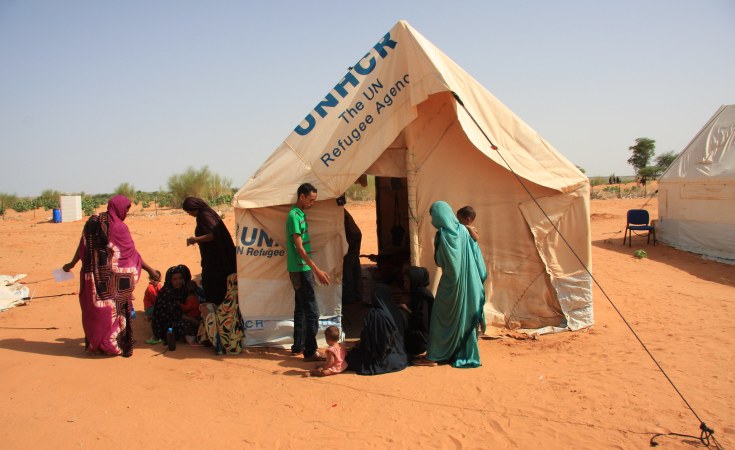Geneva — Over the next three days, more than 3,500 delegates attending the world's largest international conference on refugee issues will seek concrete, practical solutions to ease the plight of 114 million people forcibly displaced by persecution, human rights violations, violence, and armed conflict.
In opening the Global Refugee Forum Wednesday, U.N. High Commissioner for Refugees Filippo Grandi called the gathering ''an opportunity for all of us to re-commit to some basic actions needed to respond to forced displacement, protecting people forced to flee, and sharing the responsibility of those who host them.''
Ironically, the issue that looms the largest over the forum, that of the Palestinian refugees, does not fall under the UNHCR's mandate. They are under the care and protection of UNRWA, the U.N. Relief and Works Agency for Palestine Refugees.
However, Grandi, who was commissioner-general of UNRWA from 2010 to 2014, was unable to ignore what he calls ''the major catastrophe unfolding in the Gaza Strip'' triggered by the brutal invasion of Israel by Hamas militants on October 7.
''We foresee more civilian deaths and suffering, and also further displacement that threatens the region,'' he said, echoing the call of the U.N. Secretary-General ''for an immediate and sustained humanitarian ceasefire, the release of hostages'' and the resumption of a dialogue that ''brings real peace and security to the people of Israel and Palestine.''
These sentiments were forcefully brought home by Jordan's King Abdullah II in his keynote address to the conference.
''As we speak, we find ourselves dealing with another internal displacement crisis in the region. Over 1.9 million Palestinians in Gaza, many of whom themselves refugees, have been forced to flee their homes amid a relentless bombing campaign,'' he said, referring to Israeli military operations.
''With all eyes on Gaza, the international community must recognize more than ever that Band-Aid solutions are no longer feasible and that global crises demand long-term responsibility sharing,'' noting that Jordan was hosting nearly four million refugees of different nationalities--over a third of his country's population.
While confirming that Jordan continued to support the Palestinians and UNRWA in Gaza, he said there needed to be a more coordinated response and support by the international community for the needs of countries hosting refugees and asylum seekers.
''Our country is still bearing the heavy costs and burdens of the refugee communities in our midst, he said adding that international funding to meet pledges has been steadily declining.
''So far this year, we only received around 22 percent of the Response Plan needs, the lowest level ever. The rest is covered through Jordan's national budget,'' he said.
While a strong focus remains and must remain on Gaza, High Commissioner Grandi urged governments not to lose sight of other pressing humanitarian and refugee crises around the world.
''The situation of civilians in Sudan and in Ukraine, including millions who are refugees and displaced, demand our attention and support, as do protracted crises like the plight of the Rohingya, the Syria situation, Afghanistan'' and others, he said.
Belying common perceptions, UNHCR statistics confirm that low- and middle-income countries host 75 percent of the world's refugees and other people in need of international protection.
Colombia, one of four co-convenors of the Global Refugee Forum is a case in point. Colombian Vice President Francia Elena Marquez Mina told the forum that her country has the highest number of forcibly displaced persons in the world -- over 6.9 million people uprooted from their homes due to decades of internal armed conflict.
''Colombia is also the fourth country to host the largest number of refugees in the world. And today, we have about three million Venezuelans, which we have welcomed and hosted.
''Two million have benefited from a special migration status; 100,000 children have received Colombian nationality, and these are children who are at the risk of being stateless without a nationality. And, Colombia has provided them with the civil right of recognizing Colombian nationality to those children,'' she said.
''I believe this demonstrates Colombia's commitment not only to addressing the forcibly displaced population in our own country but also addressing those we are hosting who come to our country,'' she said.
However, she said that this care comes at a price. She said international legislation must be produced committing nations to support refugee hosting countries ''because our state alone does not have the capacity or resources to grapple with this situation.
''No one wants to leave the countries where they were born. No one wants to flee from their homes,'' she said. ''People leave because they want to safeguard their lives, or they want to seek better opportunities.''


